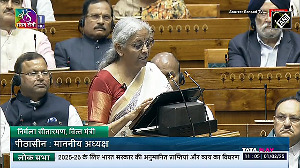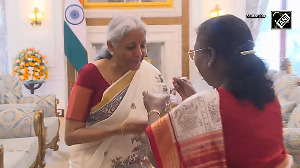India on Thursday handed over three dossiers to Pakistan, dealing with three different aspects of terrorism being bred in Pakistan.
The first dossier deals exclusively with the 26/11 Mumbai attack. The second dossier is about Ilyas Kashmiri, leader of Al-Qaeda's 313 brigade, while the third sought the handing over of the Khalistan militants and Indian Mujahideen cadres, sources told rediff.com.
In the first dossier, India sought the handing over of Jamaat-ud-Dawah chief Hafiz Saeed. Sources say that Hafiz could not figure in the earlier dossiers sent to Pakistan as agencies were gathering collective proof of his role in terrorism in India.
Moreover, the JuD's role has come into the limelight following the mass meeting they held on Kashmir Solidarity Day, in Pakistan-occupied Kashmir where an open threat was made to target various Indian cities.
The same dossier also deals with American terror suspect David Coleman Headley, who has proven to be a major link in the 26/11 case.
Coupled with the proof handed over by the Federal Bureau of Investigation, which is interrogating Headley, the Indian dossier speaks in particular about two Pakistan Army officials, one of whom is retired.
The serving army official has been referred to as Major Iqbal. The name of this Major had cropped up during Headley's interrogation when he admitted to reporting to a serving Pakistan Army Major. The Intelligence Bureau, who are also on this case, however, point out that the name Major Iqbal is fake since during such an operation the real name would never be given out.
This officer was a link between several foreign operatives and Pakistan-based terror groups. He played a major role in facilitating Headley's travel and cross over into Pakistan with ease.
Another name is that of Major Samir Ali, a retired officer of the Pakistan Army. His name had cropped up both during the investigations into the Mumbai attack as well as the Headley case. He is believed to be associated with the Lashkar-e-Tayiba.
He had served with the Pakistan Army as well as the Inter Services Intelligence, and following his retirement, worked along with terror groups as a trainer. It is believed that he was part of the team, which imparted training to 26/11 gunmen. However, the IB believes that this too is a pseudo name used for the operation.
The other names that find mention are those of Zabiuddin, a resident of Beed, who had played an active role in the Mumbai attack. The dossier also seeks the handing over Abu Hamza, who imparted accent training to the gunmen.
The second dossier is all about Ilyas Kashmiri, India's next headache. There is a lot of proof that has been built up against Kashmiri by the Indian agencies. His first ever statement came out following the news of his death in a drone attack. In a statement, he claimed that he had taken part in training the gunmen who attacked Mumbai.
He had stated that the entire operation was originally planned by the Al-Qaeda, but was hijacked by the Lashkar and the ISI. He had further threatened to launch Ghazb-e-Hind (Hate India), which involved carrying out deadlier attacks than the one in Mumbai.
Kashmiri's name cropped up again during the interrogation of Headley, who had communicated with the former for future India-based operations. The latest communication from Headley was through an email sent to a Pakistan-based website in which he had warned to disrupt every event, which had international participation.
The third dossier was prepared initially with the names of the Khalistan-based militants. However, following the Pune blast, the names of several terrorists belonging to the Indian Mujahideen too were added.
While India tells Pakistan in the dossier to probe the role of the Indian Mujahideen operatives in connection with the Pune blast, it also lays emphasis on the role of the Khalistan militants in future operations.
While making a mention about the Khalistan-based militants, it also talks about the Karachi plot in which the Lashkar had roped in these Khalistan militants to carry out assassinations of various leaders. Jagtar Singh Hawara, Ranjeet Singh and Lakhvinder Singh are the three key persons who are part of the dossier.
The Indian Mujahideen aspect too is dealt with in the third dossier. Riyaz Bhatkal, Iqbal Bhatkal and Amir Raza are the three key persons who have been running the Indian Mujahideen from Pakistan.
India has proof to show that the Bhatkal brothers are holed up in the Defence Enclave in Karachi and are under the protection of the ISI. India says that the handing over of the Bhatkal brothers would be a great step towards cracking the IM code.
Amir Raza too is an important personality in the IM set up. Following the Pune blasts, his name has cropped up several times. Raza is a Pakistan national, who oversees IM's operations from that country itself.






 © 2025
© 2025